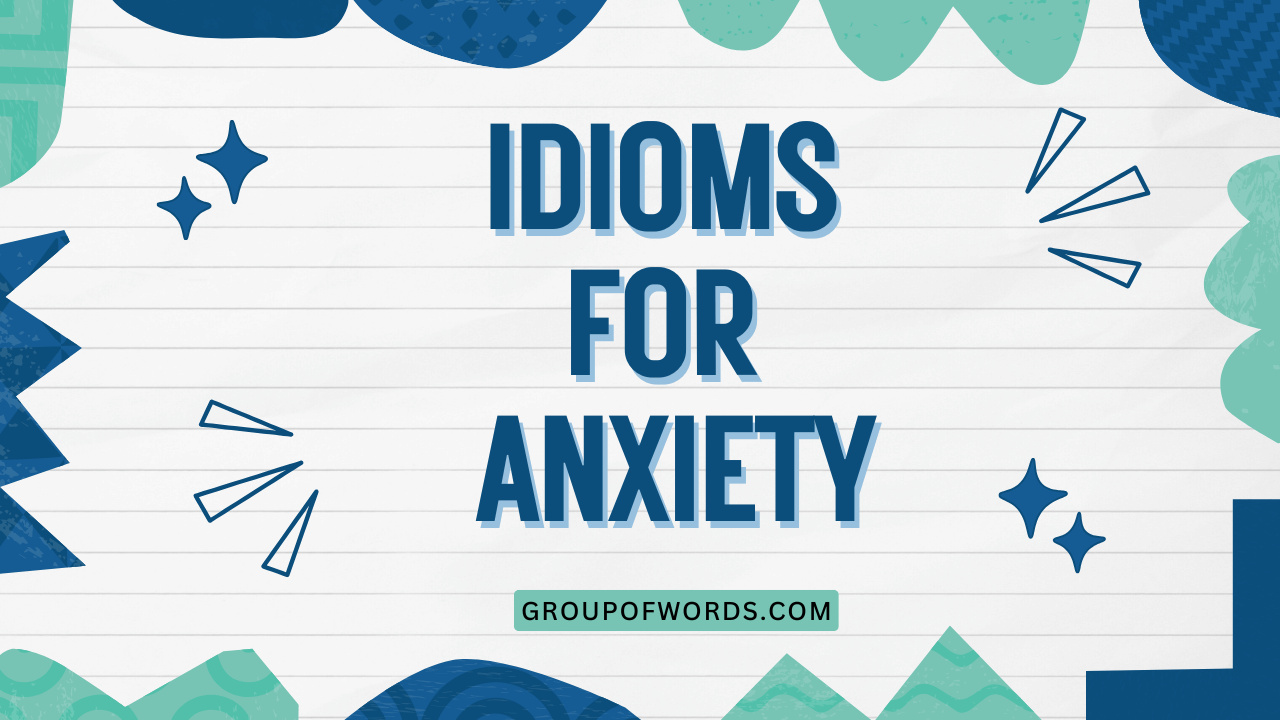Idioms for Anxiety: Mastering English Expressions
Anxiety is a universal human experience, and the English language offers a rich tapestry of idioms to describe its various facets. Understanding these idioms is crucial for both comprehending and expressing nuanced feelings of worry, stress, and unease.
This article delves into the world of idioms related to anxiety, providing clear definitions, examples, and practical exercises to help you master their usage. Whether you are an English language learner or a native speaker looking to expand your vocabulary, this guide will equip you with the tools to articulate your anxieties with greater precision and color.
This article is designed for English language learners, ESL/EFL students, and anyone interested in improving their understanding and use of English idioms. By exploring these idioms, you’ll gain a deeper appreciation for the cultural nuances embedded within the language.
You’ll also enhance your ability to communicate effectively and connect with others on a more personal level by accurately describing and understanding feelings of anxiety.
Table of Contents
- Definition of Idioms for Anxiety
- Structural Breakdown of Anxiety Idioms
- Types of Anxiety Idioms
- Examples of Anxiety Idioms
- Usage Rules for Anxiety Idioms
- Common Mistakes with Anxiety Idioms
- Practice Exercises
- Advanced Topics in Anxiety Idioms
- Frequently Asked Questions
- Conclusion
Definition of Idioms for Anxiety
Idioms are expressions whose meanings cannot be understood from the literal meanings of the individual words. They are a type of figurative language that adds color and depth to communication. Idioms for anxiety are specific phrases that describe feelings of worry, stress, fear, or unease in a non-literal way. These idioms often draw on metaphors and similes to convey the intensity and nature of anxious feelings.
Anxiety idioms serve several important functions. Firstly, they provide a more vivid and relatable way to describe abstract emotions.
Instead of simply saying “I am anxious,” one might say “I have butterflies in my stomach,” which conveys a more specific and visceral sensation. Secondly, using idioms can make communication more engaging and interesting.
Finally, understanding anxiety idioms is essential for comprehending spoken and written English, as they are frequently used in everyday conversation and literature.
Idioms can be classified based on their structure, such as phrasal verbs (e.g., “freak out”), metaphorical expressions (e.g., “on pins and needles”), and similes (e.g., “like a cat on a hot tin roof”). They also vary in formality, with some being more appropriate for casual conversation and others for formal writing.
The context in which an idiom is used is crucial for understanding its intended meaning.
Structural Breakdown of Anxiety Idioms
Anxiety idioms, like all idioms, deviate from literal interpretations. Their structure can be analyzed based on the types of words they contain and how these words combine to create a non-literal meaning.
Understanding the structural elements can help in deciphering unfamiliar idioms.
Many anxiety idioms are metaphorical, meaning they use an image or concept to represent anxiety. For example, “a nervous wreck” uses the image of a broken-down machine to describe someone who is overwhelmed with anxiety. Other idioms use similes, which make a direct comparison using “like” or “as.” “Like a cat on a hot tin roof” compares someone’s restlessness and anxiety to the frantic movements of a cat in an uncomfortable situation.
Phrasal verbs also play a role in anxiety idioms. For example, “stress out” is a phrasal verb that means to become very anxious or stressed. The combination of the verb “stress” and the particle “out” creates a meaning that is different from the individual words.
The structure of an idiom often contributes to its impact. A vivid image or comparison can make the feeling of anxiety more relatable and understandable.
Recognizing these structural patterns can improve comprehension and usage of anxiety idioms.
Types of Anxiety Idioms
Anxiety idioms can be categorized based on the specific type of anxiety they describe. Here are some common categories:
General Anxiety
These idioms describe a general state of worry or unease without specifying a particular cause or situation. They are often used to convey a feeling of being anxious or nervous in general.
Stress-Related Anxiety
These idioms focus on anxiety that stems from stress, pressure, or overwhelming demands. They often describe the feeling of being burdened or unable to cope with challenges.
Worry-Related Anxiety
These idioms emphasize the mental aspect of anxiety, focusing on excessive worrying and overthinking. They often describe the feeling of being consumed by negative thoughts.
Fear-Related Anxiety
These idioms describe anxiety that is driven by fear, whether it is a specific phobia or a more general sense of dread. They often convey the feeling of being afraid or threatened.
Anticipation-Related Anxiety
These idioms relate to anxiety that arises from anticipating a future event, whether it is a positive or negative one. They often describe the feeling of being nervous or apprehensive about what is to come.
Examples of Anxiety Idioms
This section provides a comprehensive list of anxiety idioms, categorized by type, with example sentences to illustrate their usage. The tables below provide a clear and organized view of these expressions.
General Anxiety
These idioms describe a general state of worry or unease. The following table provides examples of such idioms along with their meanings and example sentences.
| Idiom | Meaning | Example Sentence |
|---|---|---|
| Butterflies in my stomach | Feeling nervous or anxious, especially before an event | I always get butterflies in my stomach before giving a presentation. |
| On pins and needles | Extremely anxious or nervous about something that is going to happen | We were on pins and needles waiting for the test results. |
| A nervous wreck | Extremely nervous or anxious | She was a nervous wreck before her job interview. |
| In a cold sweat | Feeling very anxious or frightened, often with physical symptoms like sweating | He woke up in a cold sweat after having a nightmare. |
| Anxious as a long-tailed cat in a room full of rocking chairs | Extremely anxious and restless | He was as anxious as a long-tailed cat in a room full of rocking chairs before the surgery. |
| Have kittens | To be very worried or upset | My mother will have kittens if she finds out I crashed the car. |
| Be climbing the walls | To be very anxious and restless | The kids were climbing the walls waiting for the pizza to arrive. |
| Be in a stew | To be in a state of anxiety or agitation | She’s been in a stew all day about the upcoming meeting. |
| Be beside oneself | To be extremely worried and upset | She was beside herself with worry when her child went missing. |
| Sweating bullets | Extremely nervous and anxious. | I was sweating bullets during the exam, even though I studied hard. |
| Have a frog in one’s throat | To have difficulty speaking due to nervousness. | I had a frog in my throat as I started my speech. |
| Be a bundle of nerves | To be very nervous and tense. | She was a bundle of nerves before going on stage. |
| Be on edge | To be nervous and irritable. | He’s been on edge all day waiting for the important phone call. |
| Be wired | To be nervous and unable to relax. | After drinking too much coffee, I felt wired and couldn’t sleep. |
| Chew one’s fingernails | To be nervous and anxious. | She started to chew her fingernails as the deadline approached. |
| Get one’s knickers in a twist | To become unnecessarily anxious or upset. | Don’t get your knickers in a twist, it’s just a small mistake. |
| Pull one’s hair out | To be extremely frustrated and anxious. | I was ready to pull my hair out trying to fix the computer. |
| Shake like a leaf | To tremble from fear or nervousness. | He was shaking like a leaf when he saw the spider. |
| Worry oneself sick | To worry so much that one becomes ill. | She worried herself sick waiting for her son to come home. |
| Be tearing one’s hair out | To be extremely worried and stressed about something. | She was tearing her hair out trying to meet the deadline. |
| In a state of agitation | Being visibly restless, anxious, or upset. | He was in a state of agitation after hearing the bad news. |
| Have the heebie-jeebies | To feel nervous or uneasy. | The old house gave me the heebie-jeebies. |
| Be a coiled spring | To be tense and ready to react at any moment. | He was like a coiled spring waiting for the signal. |
Stress-Related Anxiety
These idioms describe anxiety that stems from stress, pressure, or overwhelming demands. The following table provides examples of such idioms along with their meanings and example sentences.
| Idiom | Meaning | Example Sentence |
|---|---|---|
| At the end of one’s rope | Having no more patience, energy, or resources to cope with a difficult situation | After weeks of sleepless nights, I was at the end of my rope. |
| Up to one’s ears in | Completely overwhelmed with work or responsibilities | I’m up to my ears in paperwork this week. |
| Bite off more than one can chew | To take on more responsibilities or tasks than one can handle | He bit off more than he could chew when he volunteered to organize the entire event. |
| Burn the candle at both ends | To work very hard and late, often to the detriment of one’s health | She’s been burning the candle at both ends trying to finish the project on time. |
| Under pressure | Feeling stressed because of demands on one’s time and energy | He’s been under a lot of pressure at work lately. |
| Stressed out | Feeling overwhelmed by stress. | I’m completely stressed out with all these deadlines. |
| Driven up the wall | Extremely irritated and stressed. | The constant noise from construction is driving me up the wall. |
| Feel the weight of the world on one’s shoulders | To feel burdened by responsibilities and stress. | He felt the weight of the world on his shoulders after the company’s failure. |
| Go spare | To become very angry or stressed. | My boss will go spare if I miss another deadline. |
| Have a lot on one’s plate | To have many responsibilities and tasks to handle. | I have a lot on my plate right now, so I can’t take on any more projects. |
| Hang by a thread | To be in a precarious or unstable situation. | His job is hanging by a thread after the recent budget cuts. |
| Keep one’s head above water | To manage to survive or cope with a difficult situation. | It’s hard to keep my head above water with all these bills. |
| Lose one’s cool | To become angry or stressed. | He lost his cool when he realized he was late for the meeting. |
| Run ragged | To be exhausted and stressed from overwork. | I’ve been run ragged all week trying to prepare for the conference. |
| Spread oneself too thin | To try to do too many things at once, resulting in stress and inefficiency. | She spread herself too thin by volunteering for too many committees. |
| Take its toll | To have a negative effect on one’s health or well-being. | The stress of the job is taking its toll on his health. |
| Tense up | To become physically or mentally tense due to stress. | He tensed up when the interviewer asked about his weaknesses. |
| Under the gun | Under intense pressure to achieve a goal or meet a deadline. | We’re under the gun to finish the project by Friday. |
| Wear thin | To become less effective or bearable due to overuse or stress. | Her patience is wearing thin with his constant complaining. |
| Worn to a frazzle | Exhausted and stressed. | She was worn to a frazzle after taking care of her sick child all night. |
Worry-Related Anxiety
These idioms emphasize the mental aspect of anxiety, focusing on excessive worrying and overthinking. The following table provides examples of such idioms along with their meanings and example sentences.
| Idiom | Meaning | Example Sentence |
|---|---|---|
| Lose sleep over something | To worry so much about something that you can’t sleep | Don’t lose sleep over it; it’s not worth it. |
| Rack one’s brain | To think very hard about something, often to solve a problem or remember something | I’ve been racking my brain trying to remember where I left my keys. |
| Cross that bridge when one comes to it | To deal with a problem or situation when it arises, rather than worrying about it in advance | Let’s cross that bridge when we come to it; there’s no point in worrying about it now. |
| Borrow trouble | To worry about something that may not happen | You’re just borrowing trouble by worrying about things you can’t control. |
| Make a mountain out of a molehill | To exaggerate the importance of a problem or issue | Don’t make a mountain out of a molehill; it’s just a minor setback. |
| Bother oneself | To worry or concern oneself about something. | Don’t bother yourself with the small details. |
| Dwell on | To think or talk about something for a long time. | Try not to dwell on the negative aspects of the situation. |
| Get worked up | To become anxious or excited. | Don’t get worked up over it; it’s not worth it. |
| Go over in one’s mind | To think repeatedly about something. | I keep going over the conversation in my mind, trying to figure out what I said wrong. |
| Have one’s head in the clouds | To be lost in thought and not paying attention to what’s happening around you. | He has his head in the clouds and doesn’t seem to notice the problem. |
| Keep one up at night | To cause someone to stay awake worrying. | The upcoming deadline is keeping me up at night. |
| Let something eat away at one | To cause someone to feel increasingly worried or unhappy. | The guilt of lying has been eating away at me for days. |
| Overthink | To think too much about something, leading to anxiety. | I tend to overthink things and create unnecessary stress. |
| Ruminate on | To think deeply about something, often in a negative way. | She tends to ruminate on past mistakes. |
| Stew over | To worry or fret about something. | He was stewing over the possibility of losing his job. |
| Take something to heart | To take something very seriously and worry about it. | She took his criticism to heart and felt very upset. |
| Toss and turn | To move around restlessly in bed, unable to sleep due to worry. | I spent the night tossing and turning, unable to fall asleep. |
| Twist oneself into knots | To worry excessively about something. | Don’t twist yourself into knots over it; it’s not that important. |
| Worry wart | A person who worries excessively. | She’s such a worry wart; she’s always concerned about everything. |
| Be tearing one’s hair out | To be extremely worried and stressed about something. | She was tearing her hair out trying to meet the deadline. |
Fear-Related Anxiety
These idioms describe anxiety that is driven by fear, whether it is a specific phobia or a more general sense of dread. The following table provides examples of such idioms along with their meanings and example sentences.
| Idiom | Meaning | Example Sentence |
|---|---|---|
| Have a close call | To narrowly avoid danger or a negative outcome | We had a close call when a car almost hit us in the intersection. |
| Jump out of one’s skin | To be startled or frightened | I jumped out of my skin when I heard the loud noise. |
| Scared stiff | Extremely frightened | He was scared stiff when he saw the ghost. |
| Afraid of one’s own shadow | Very timid and easily frightened | She’s so nervous; she’s afraid of her own shadow. |
| Have a phobia | To have an extreme or irrational fear of something. | I have a phobia of spiders. |
| Be petrified | To be extremely frightened. | She was petrified of public speaking. |
| Be frozen with fear | To be so frightened that you cannot move. | He was frozen with fear when he saw the bear. |
| Be in a cold sweat | To be very frightened, often with physical symptoms like sweating. | He woke up in a cold sweat after having a nightmare. |
| Be shaking in one’s boots | To be very frightened. | He was shaking in his boots before his first skydiving jump. |
| Chicken out | To back out of something due to fear. | He was going to ask her out, but he chickened out at the last minute. |
| Get the jitters | To feel nervous or anxious. | I always get the jitters before a big game. |
| Go weak at the knees | To feel faint or unsteady due to fear. | She went weak at the knees when she saw the accident. |
| Have a scare | To experience a frightening event. | We had a scare when we almost got lost in the woods. |
| Run for one’s life | To run away in order to avoid danger. | We had to run for our lives when the building caught fire. |
| See ghosts | To imagine dangers or threats that are not real. | He’s always seeing ghosts; he’s too paranoid. |
| Send shivers down one’s spine | To cause a feeling of fear or excitement. | The horror movie sent shivers down my spine. |
| Take fright | To become suddenly frightened. | The horse took fright and bolted. |
| Turn pale | To become pale in the face due to fear. | He turned pale when he heard the news. |
| Have the willies | To feel nervous or uneasy. | The abandoned house gave me the willies. |
| In mortal fear | To be extremely afraid of death or serious injury. | She was in mortal fear during the storm. |
Anticipation-Related Anxiety
These idioms relate to anxiety that arises from anticipating a future event, whether it is a positive or negative one. The following table provides examples of such idioms along with their meanings and example sentences.
| Idiom | Meaning | Example Sentence |
|---|---|---|
| Hold one’s breath | To wait anxiously for something to happen | We’re holding our breath waiting for the election results. |
| Wait with bated breath | To wait anxiously or excitedly for something to happen | The audience waited with bated breath for the magician’s next trick. |
| On tenterhooks | In a state of suspense or agitation because of uncertainty | We were on tenterhooks waiting to hear if we got the job. |
| Anticipate with dread | To look forward to something with fear or anxiety. | I anticipate the dentist appointment with dread. |
| Be keyed up | To be excited and tense. | She was keyed up before the competition. |
| Be on the lookout | To be watching carefully for something to happen. | We’re on the lookout for any signs of trouble. |
| Brace oneself | To prepare for something unpleasant or difficult. | We need to brace ourselves for a tough week ahead. |
| Count the days | To eagerly anticipate an upcoming event. | I’m counting the days until my vacation. |
| Dread the thought of | To fear something that is going to happen. | I dread the thought of having to give another presentation. |
| Get cold feet | To become nervous before an important event. | He got cold feet and decided not to go through with the wedding. |
| Have butterflies in one’s stomach | To feel nervous or anxious, especially before an event. | I always have butterflies in my stomach before giving a presentation. |
| Look forward to with trepidation | To anticipate something with a mixture of excitement and fear. | I look forward to the trip with trepidation because of my fear of flying. |
| Mark time | To do something to pass the time while waiting for something else to happen. | We’re just marking time until the project starts. |
| Nervous anticipation | A state of anxiety while looking forward to something. | There was a feeling of nervous anticipation in the air. |
| On pins and needles | Extremely anxious or nervous about something that is going to happen. | We were on pins and needles waiting for the test results. |
| See the light at the end of the tunnel | To see signs that a difficult situation is coming to an end. | We’re finally seeing the light at the end of the tunnel after months of hard work. |
| Sweat it out | To wait anxiously for something to happen. | We just have to sweat it out until the results are announced. |
| The calm before the storm | A period of peace before a period of chaos or difficulty. | It’s just the calm before the storm; things are going to get crazy soon. |
| Waiting game | A situation where one must wait patiently for something to happen. | It’s just a waiting game now; we have to be patient. |
| With trepidation | With fear or apprehension. | She approached the task with trepidation. |
Usage Rules for Anxiety Idioms
Using anxiety idioms correctly requires understanding their specific meanings and contexts. Here are some general rules to follow:
- Understand the meaning: Make sure you know the precise meaning of the idiom before using it. Using an idiom incorrectly can lead to confusion or miscommunication.
- Consider the context: Idioms are often informal and may not be appropriate for formal writing or speaking. Consider your audience and the situation before using an idiom.
- Use the correct form: Some idioms have specific grammatical structures that must be followed. For example, “at the end of one’s rope” requires the possessive pronoun “one’s.”
- Don’t mix idioms: Avoid combining parts of different idioms or creating new idioms. This can sound awkward and confusing.
- Be aware of cultural differences: Some idioms may be specific to certain regions or cultures. Make sure the idiom is appropriate for your audience.
It’s also important to note that some idioms can have multiple meanings depending on the context. Pay attention to the surrounding words and phrases to determine the intended meaning.
Common Mistakes with Anxiety Idioms
Here are some common mistakes that learners make when using anxiety idioms:
| Incorrect | Correct | Explanation |
|---|---|---|
| I have butterflies on my stomach. | I have butterflies in my stomach. | The correct preposition is “in,” not “on.” |
| She was on needles and pins. | She was on pins and needles. | The correct order is “pins and needles.” |
| He is a nervous wrecking ball. | He is a nervous wreck. | The idiom is “nervous wreck,” not “nervous wrecking ball.” |
| I’m at the end of my rope’s. | I’m at the end of my rope. | The idiom does not require a possessive ‘s’. |
| She is up to her head in work. | She is up to her ears in work. | The correct body part is “ears,” not “head.” |
| He bit more than he can chew it. | He bit off more than he can chew. | The correct phrasal verb is “bite off.” |
| She’s burning the candle on both ends. | She’s burning the candle at both ends. | The correct preposition is “at,” not “on.” |
| I’m feeling weight of the world on my shoulders. | I’m feeling the weight of the world on my shoulders. | The idiom requires the definite article “the.” |
| Don’t lose sleep for it. | Don’t lose sleep over it. | The correct preposition is “over,” not “for.” |
| Cross the bridge before you get there. | Cross that bridge when you come to it. | The idiom refers to crossing the bridge when you arrive. |
By being aware of these common mistakes, you can avoid making them yourself and use anxiety idioms correctly.
Practice Exercises
Test your understanding of anxiety idioms with these practice exercises. Choose the correct idiom to complete each sentence.
| Question | Options | Answer |
|---|---|---|
| 1. I always get ________ before giving a presentation. | a) butterflies in my stomach b) ants in my pants c) bees in my bonnet | a) butterflies in my stomach |
| 2. We were ________ waiting for the test results. | a) on pins and needles b) on thorns c) on thin ice | a) on pins and needles |
| 3. She was ________ before her job interview. | a) a nervous wreck b) a broken record c) a loose cannon | a) a nervous wreck |
| 4. After weeks of sleepless nights, I was ________. | a) at the end of my rope b) in deep water c) out of the woods | a) at the end of my rope |
| 5. I’m ________ paperwork this week. | a) up to my ears in b) over my head c) in the thick of | a) up to my ears in |
| 6. Don’t ________; it’s not worth it. | a) lose sleep over it b) cry over spilled milk c) beat a dead horse | a) lose sleep over it |
| 7. He ________ when he saw the ghost. | a) scared stiff b) jumped the gun c) bit the bullet | a) scared stiff |
| 8. We’re ________ waiting for the election results. | a) holding our breath b) biting our nails c) sitting tight | a) holding our breath |
| 9. She’s been ________ trying to finish the project on time. | a) burning the candle at both ends b) running around in circles c) going the extra mile | a) burning the candle at both ends |
| 10. I tend to ________ things and create unnecessary stress. | a) overthink b) undersell c | a) overthink |
Advanced Topics in Anxiety Idioms
For advanced learners, exploring the etymology and cultural context of anxiety idioms can provide a deeper understanding of their usage. Many idioms have historical roots that shed light on their meanings.
For example, the idiom “on tenterhooks” comes from the textile industry, where cloth was stretched on frames called tenterhooks. Understanding this origin can help one appreciate the feeling of being stretched and strained with anxiety.
Additionally, analyzing how anxiety idioms are used in literature and media can provide insights into their stylistic effects. Authors and speakers often use idioms to create vivid imagery and convey complex emotions in a concise way.
By studying these examples, learners can develop a more nuanced understanding of how to use anxiety idioms effectively.
Furthermore, comparing anxiety idioms across different languages can reveal interesting cultural differences in how anxiety is perceived and expressed. While some idioms may have direct equivalents in other languages, others may be unique to a particular culture.
Exploring these differences can enhance cross-cultural communication and understanding.
Frequently Asked Questions
What is the difference between an idiom and a metaphor?
An idiom is a phrase whose meaning is not predictable from the usual meanings of its constituent elements. A metaphor is a figure of speech in which a word or phrase is applied to an object or action to which it is not literally applicable.
While many idioms are metaphorical, not all metaphors are idioms. Idioms have a fixed meaning, whereas metaphors can be more flexible and open to interpretation.
How can I improve my understanding of idioms?
The best way to improve your understanding of idioms is to read and listen to English as much as possible. Pay attention to how native speakers use idioms in different contexts.
You can also use idiom dictionaries and online resources to learn the meanings and origins of idioms. Practice using idioms in your own writing and speaking to become more comfortable with them.
Are idioms the same in all English-speaking countries?
No, idioms can vary between different English-speaking countries and regions. Some idioms may be more common in British English than in American English, and vice versa.
Be aware of these regional differences and use idioms that are appropriate for your audience.
Is it okay to use idioms in formal writing?
In general, idioms are more appropriate for informal writing and speaking. In formal writing, it is often better to use more direct and literal language.
However, there may be situations where an idiom can be used effectively in formal writing to add emphasis or color. Use your judgment and consider your audience and purpose.
Conclusion
Mastering idioms for anxiety is a valuable skill for English language learners and native speakers alike. By understanding the meanings, structures, and usage rules of these expressions, you can communicate your feelings of worry, stress, and unease with greater precision and color.
This article has provided a comprehensive guide to anxiety idioms, with examples, exercises, and tips for avoiding common mistakes. Continue practicing and exploring these expressions to enhance your English language proficiency and connect with others on a deeper level.






